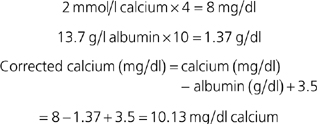25 Protein losing enteropathy in a dog
Problem list and discussion of problems
Differential diagnosis
Differential lists for the diarrhoea (small intestinal):
• Dietary
• changes of diet – possible with a variety of food being fed; however, the diarrhoea started prior to the variations in diet
• Kidney disease – unlikely as he did not have polyuria/polydipsia (pu/pd), although glomerular disorders may present without pu/pd
Case work-up
Imaging
Clinical tip on fluid analysis
The type of fluid present in an effusion gives an indication of the source. Modified transudates, transudates and exudates are distinguished by the specific gravity, total protein, number of nucleated cells, the cell type and the presence of bacteria (see Table 25.1).
Stay updated, free articles. Join our Telegram channel

Full access? Get Clinical Tree




